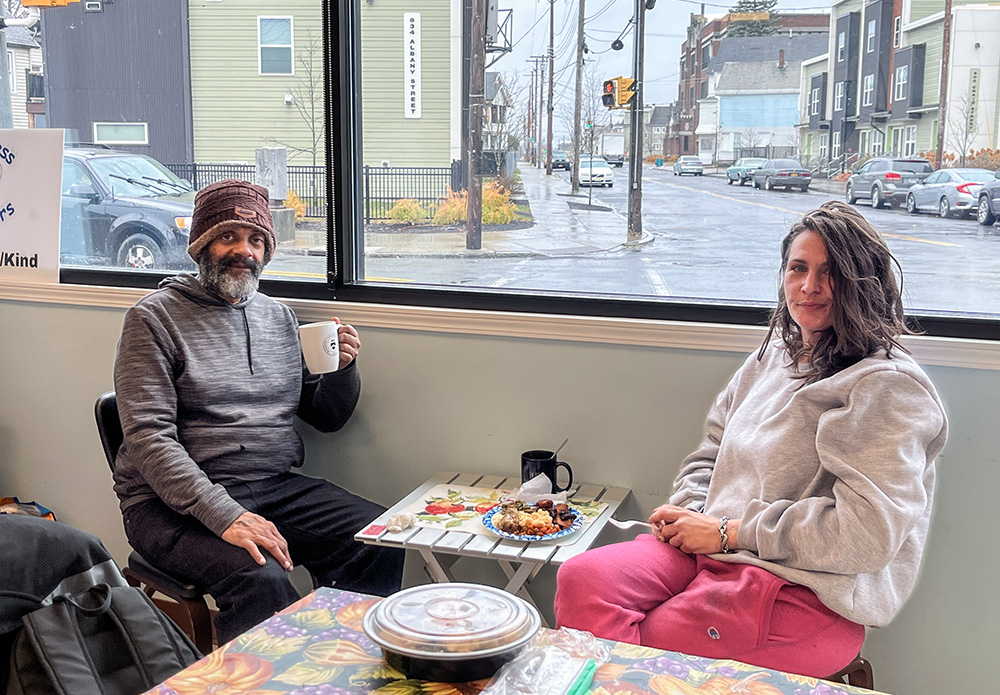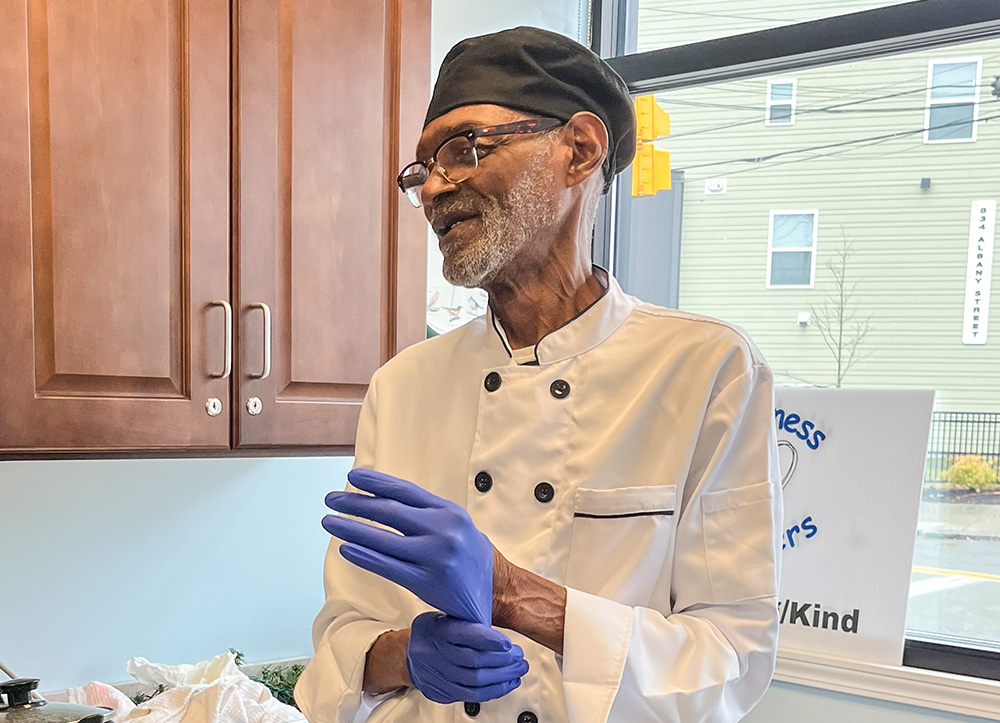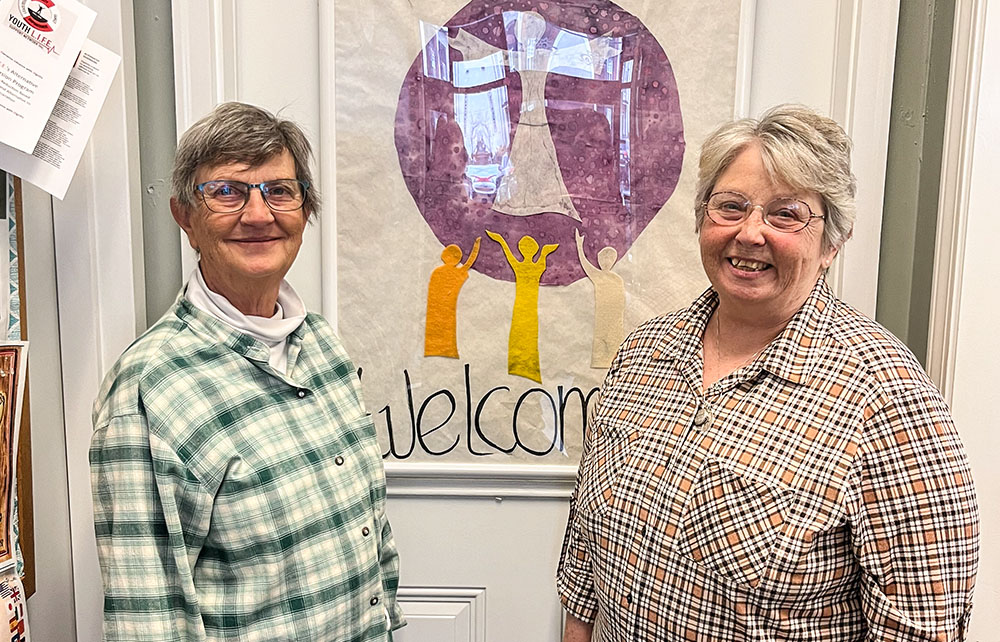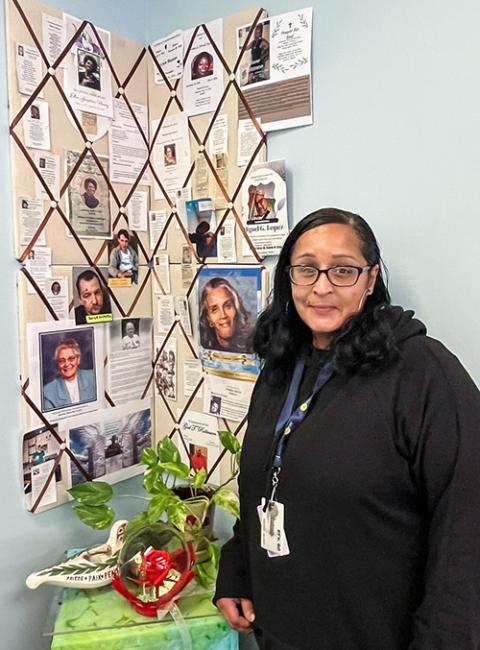
Guests Gregory Morton and Angela Rice sit in the front room of St. Joseph's Place in Schenectady, N.Y. "This is a safe haven," Morton said. "If they're open, I'm here." (Sara Foss)
People come to St. Joseph's Place for many reasons. Some come for coffee and cookies, quiet conversation and a place to sit. Others come to use the bathroom or phone. There is free clothing — socks, underwear, hats and more — and sometimes bagged lunches to go.
For regulars, the biggest draw is the nuns, three Sisters of St. Joseph of Carondelet in their 70s who run St. Joseph's Place. They provide comfort, care and counsel, which are intangible but very much needed.
"This is a safe haven," Gregory Morton, 56, said while sipping coffee in St. Joseph's Place's brightly lit front room. "If they're open, I'm here."
St. Joseph's Place is a drop-in center for the poor in Schenectady, New York. This small city thrived when General Electric was headquartered there but fell on hard times when the company began downsizing its local workforce. In recent years, Schenectady has undergone something of a renaissance. But the rising prosperity has left some behind, and that is who St. Joseph's Place serves.
The center is open four mornings every week and receives 30-40 visitors daily. It shares space with the Sycamore Collaborative, a nonprofit organization that runs a large food pantry and occupies a busy intersection in Hamilton Hill, a troubled neighborhood where substance abuse, food insecurity and housing instability are common.
This year, St. Joseph's Place celebrated its 10th anniversary.
Advertisement
The center was the brainchild of the late Fr. Michael Hogan, a priest at St. Joseph's Church, a nearby parish. Hogan believed Hamilton Hill would benefit from a Catholic presence, and he recruited Srs. Linda Neil and Ann Christi Brink of the Sisters of St. Joseph of Carondelet Albany Province to run it.
Neil initially resisted the idea.
After nearly four decades, she had retired from teaching and was looking for a new ministry. But she didn't like cities. Brink, who died in 2023, was also looking for a project. She approached Neil about teaming up to run St. Joseph's Place.
The two religious began talking to Schenectady nonprofits, churches and other organizations to find out how they could best help Hamilton Hill. They learned that these groups met basic needs but could not do much else. "They said, 'We can get people services, but we don't have time to sit and listen to them,' " Neil said.
St. Joseph's Place fills that void, offering a respite from hardship, pain and never-ending worries about getting by. The interior is colorful and inviting, with art on the walls, music on the radio, and a quiet chapel guests can retreat to for prayer and privacy.
"This is about being with people and making them feel valued," said Sr. Peggy Hoerburger, 72, a longtime volunteer. "It's about having a place where people feel cared about."

Chris Gibson, a neighborhood resident, prepared a Thanksgiving feast for St. Joseph's Place guests. (Sara Foss)
Toward the end of November, a steady stream of people trickled into St. Joseph's Place for a free Thanksgiving meal. Chris Gibson, a Hamilton Hill resident who got to know the nuns while working nearby as a contractor, put the spread together.
Dressed in a black-and-white chef's outfit, Gibson, a 67-year-old recovering alcoholic, served the food. He said he tries to support the nuns as much as he can. "There are people out there that nobody is helping," he said. "The nuns are trying to help and uplift them, and I appreciate that."
Though St. Joseph's Place is now a lively community hub, its early days were defined by uncertainty over whether the center would succeed. Few visited, and the nuns spent many hours alone. "People were leery," Neil, 74, said.
Over time, people began to trickle in, and the nuns earned residents' trust. Occasionally, behavioral issues are dealt with.
Three women got into a heated dispute while visiting St. Joseph's Place this fall. When one woman picked up a chair intending to throw it, one man seized it, and another stepped forward to protect the target. The nuns called the police, kicked everyone out and banned the would-be chair thrower from the premises.
"It got pretty nasty, but the thing is, the people in the neighborhood respect this place," Neil said.

St. Joseph Srs. Linda Neil and Cathy Kruegler, St. Joseph's Place co-directors (Sara Foss)
Inside the chapel hangs a collage of photographs and obituaries of St. Joseph Place guests who have died. Many had chronic health problems, but sometimes substance abuse was a factor. Neil said that drugs in the neighborhood have worsened in recent years, and guests are increasingly erratic.
"Now people come in, they're stoned, they're drunk," she said. "It's like, 'OK, as long as you behave.' "
When Darla Wharry, 47, first visited St. Joseph's Place a decade ago, she had been living on the streets of Schenectady for more than 20 years and was addicted to drugs. "I was in a very dark place, with a lot of hurt [and] pain," she said. "I came here every day. The sisters talked to me. They prayed for me."

Darla Wharry stands in front of a collage featuring photographs and obituaries of St. Joseph's Place regulars who have died. (Sara Foss)
Four years ago, Wharry's mother died. It was a turning point. She got clean and works for Catholic Charities as a harm reduction specialist. She visits St. Joseph's Place to connect with people fighting the same demons she once battled. "The women — I see so much of myself in them," she said.
"I cried when I saw Darla [after she got clean]," Hoerburger said.
Wharry beamed and responded, "You loved me through it all."
Sr. Cathy Kruegler, 74, became St. Joseph's Place co-director three years ago after Brink died. She recalled arranging for a man with an infected arm to go to the emergency room. "The doctor told me that if he had come in a half hour later, he would have lost his arm," she said. "I saved his arm. Maybe I saved his life."
Neil said that, at times, she feels burned out. But her belief in the St. Joseph's Place mission remains strong.
"This is the way Jesus asked us to interact with our neighbors," she said. "The way you love God is how you love your neighbor. There's no distinction there. And I do reflect on that. I ask myself, 'How did you do today? Were you kind? Did you make people laugh?' "
The number of sisters in the U.S. has declined dramatically over the past 50 years, but the nuns don't dwell on this.
"What good does it do anybody to be sitting out here twiddling our thumbs?" Kruegler said. "As long as we've got breath, we've got something to give."





